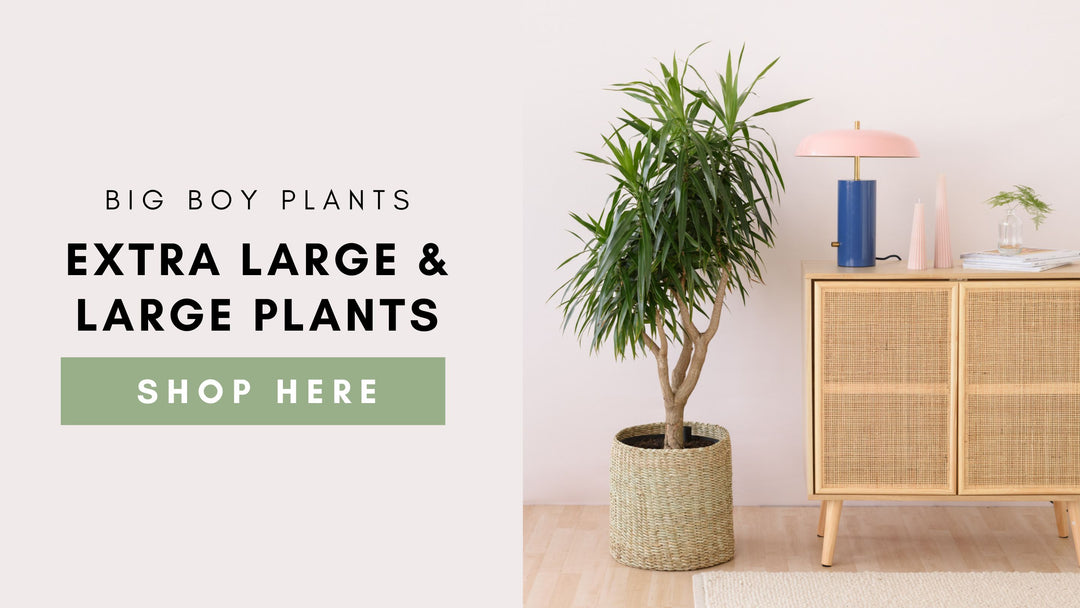Ponytail Palm Care Instructions
Scientific name : Beaucarnea recurvata
Synonym: Ponytail Palm, Elephant Foot Plant, Nolina
The Ponytail Palm is a curious looking plant, with a thick bulbous trunk and long flowing delicate fronds sprouting from the top, giving the appearance of a lush green fountain. Its native Mexico, where it has adapted to live in arid terrain, adds to its glorious attributes, in particular for its love of sunlight, making it a great houseplant for that sunny spot where nothing grows, or an ideal addition to any patio or balcony oasis.
In addition to being extremely easy to care for, the Ponytail Palm's swollen base stores water, making the plant an ideal Waterwise choice. For plant lovers that are a little forgetful about watering, this plant is ideal! It is a slow grower under the best circumstances, so a little patience is required until it reaches full maturity.
Ponytail Palms are excellent houseplants for beginners and enthusiasts who would like something low maintenance and attractive to add to their collection. They make a charming tabletop display when young and once they get mature, they will grow large, creating a stunning floor level specimen that will brighten up any room.
Please note: Ponytail Palms are considered safe for Pets and children.
Ponytail Palm Common Symptoms
- Crispy brown tips on the leaves: this will happen due to age and also if the humidity is very low. Once they have turned brown they will not go green again. Cut the brown tips off and look for ways to improve the humidity conditions to prevent future brown leaf tips.
- Dry, brown foliage and shriveled stem are a sign of underwatering. Although the plant can survive without water for long stretches, it’s not invincible! Despite its ability to survive with little water and care, it will benefit from frequent watering, and since it is a slow-growing plant anyway, it is a good idea not to treat it poorly.
- Light new growth accompanied by stem or root rot are signs that you are overwatering your plant. Let the soil dry out before you water the plant again. Remember that the base or bulb of the plant stores water and the plant won’t need water as regularly as most other houseplants. Read for more on Identifying Overwatering Vs Underwatering.
- Pests: Mealy bugs and scale are insects that may infest your Ponytail Palm. They suck sap from the leaves and disrupt the plant’s normal growth and plant functions. Remove topically with a soft tissue and treat with an organic pesticide, such as Neem Oil. Read for more on Identifying and Treating Common Houseplant Pests.
Ponytail Palm Care Instructions
- Origin: Mexico
- Height: Can reach up to 2m
- Light: Likes very bright, indirect light or full sun.
- Water: Always allow the soil to dry out a bit between watering. During the warmer months, you may need to water the Ponytail Palm more often due to the warm weather. During winter water it just enough to prevent it from drying out completely. When in doubt, do not water!
- Temperature: Ponytail Palms like warm temperatures above15°C.Although the can survive continuous temperatures lower than 15°C, they do not grow well.
- Soil: As the soil of the Ponytail Palm needs to dry out, use a potting mix that drains well. This will help prevent overwatering.
- Fertilizer: Feed monthly in spring and summer with a balanced fertilizer diluted by half. Don’t feed in winter.
- Repotting: If the plant is growing well and your aim is to grow a large tree, you can repot it every year. If the growing conditions are not the best or if you want to restrict the size of the plant, only repot the Ponytail Palm every 2-3 years.
- Pruning: Remove any yellow or leaves developing brown/black spots immediately.
- Propagation: Offsets: If your plant sprouts out little offsets from its base, they can be removed in spring and potted in their own containers. These offsets may prove a little difficult to grow, however. If they are removed from the parent plant too early they will not produce roots and will die. Consider using a rooting hormone to improve success.
If in stock, shop for Ponytail Palm here.





